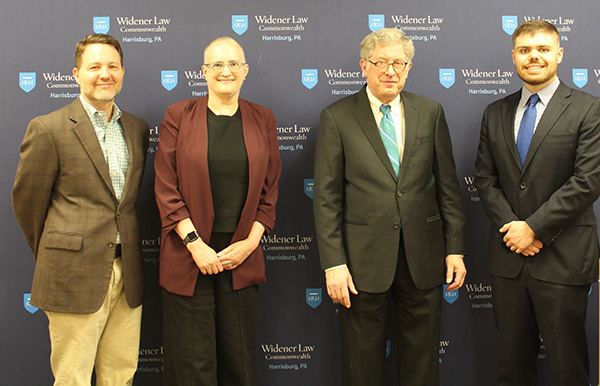
Widener Law Commonwealth Welcomes Ronald M. Levin for Annual Gedid Lecture on U.S. Supreme Court’s Loper Bright Ruling
Widener University Commonwealth Law School welcomed Ronald M. Levin to campus recently for the 2025 John Gedid Lecture, where he tackled one of the most talked-about U.S. Supreme Court decisions in administrative law in recent memory.
Levin, the William R. Orthwein Distinguished Professor of Law at Washington University in St. Louis, delivered the lecture, “The Limits of Loper Bright.” The talk offered a look at the Supreme Court’s recent decision in Loper Bright Enterprises v. Raimondo and what it could mean for the future of judicial review.
At the center of the discussion: the court’s decision to overturn the Chevron doctrine, a long-standing legal principle that required courts to defer to federal agencies’ reasonable interpretations of ambiguous laws. Levin, a leading scholar in administrative law, said the move is significant—but not as earth-shattering as some might think.
“This isn’t a revolution,” he said. “It’s more of an evolution in how courts handle agency interpretations.”
Levin explained that rather than giving automatic deference, courts will now weigh agency interpretations for their persuasiveness, marking a return to pre-1980s standards. “The elimination of Chevron deference essentially restores judicial independence in statutory interpretation,” he said, “but it doesn’t signal an outright rejection of agency authority.”
The lecture drew a crowd that included students, faculty, alumni, and legal professionals. Levin walked attendees through the Loper Bright case. He pointed out that while the Court’s ruling might reflect growing skepticism about the administrative state, the true impact will play out in how future courts interpret and apply the decision.
Levin also touched on the revival of the Skidmore doctrine, which allows courts to consider agency reasoning based on how thorough, consistent, and well-explained it is. Skidmore, he suggested, might offer a more nuanced approach moving forward—less rigid than Chevron, but still respectful of agency expertise.
“Courts will still listen to what agencies have to say,” Levin said. “They just won’t be bound to agree with them.”
The Law and Government Institute’s annual John Gedid Lecture honors Professor John L. Gedid, the founding vice dean of Widener Law Commonwealth and the founding director of the Institute. The lecture is held during the spring semester and covers a timely topic of administrative law.
Dean andré douglas pond cummings reflected on Gedid’s lasting influence during his welcome remarks.
“John Gedid founded the Law and Government Institute and was one of the pillars of our law school,” cummings said. “We continue to honor his vision and leadership, ensuring his legacy endures through events like this.”
Professor Jill Family, current faculty advisor to the institute, emphasized the lecture’s value to students. “The institute focuses on the complex intersection of legislation, regulation, public policy, and the law,” Family said. “This lecture series lets us spotlight the work of nationally recognized scholars—just as Professor Gedid was so passionate about doing.”
Third-year student Ben McFadden, president of the Law and Government Student Society, introduced Levin and highlighted the importance of hearing directly from experts in the field.
“Professor Levin’s expertise brings critical insight into the evolving landscape of administrative law,” McFadden said.
“This is the kind of real-world perspective that makes the law come alive for students like me.”
Levin wrapped up his talk by encouraging students to stay engaged in the ongoing conversation about courts, agencies, and how laws are interpreted.
“The landscape of administrative law is always shifting,” he said. “As legal practitioners, it’s crucial that we continue to critically assess how courts balance statutory interpretation with the realities of agency expertise.”
